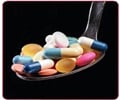Letting lab rats and mice eat as much as they want could affect the result of experiments in which ‘test-tubes-on-four-feet’ are employed to test new drugs and other substances for toxicity.
The prevalent practice of permitting lab rats and mice to eat as much as they want could affect the result of experiments in which scientists employ these ‘test-tubes-on-four-feet’ to test new drugs and other substances for toxicity and other effects. That's the conclusion of a new analysis published in ACS' journal
Chemical Research in Toxicology.
Laboratory mice and rats serve as stand-ins for people for research that cannot be done on humans. In the article, Gale Carey and Lisa Merrill point out that the millions of lab rodents used in laboratory studies each year have a nutritional status that is different from other test animals. While other test animals are fed meals, rodents have round-the-clock access to food. And eat they do, gaining more weight and more body fat than meal-fed rodents. The authors cite other research indicating that lab rodents with free access to food tend to develop abnormally high blood fat levels, high cholesterol, nerve and heart damage, cancer and other disorders.
Their analysis of 54 studies concluded that having free access to food is likely to affect the results of tests for the toxicity and cancer-causing effects of new drugs and other substances in rodents, and could be the reason why such studies have been varying so much in recent years. "Therefore, it is crucial that feeding regimen be carefully considered in designing toxicology experiments," say the authors.
Source-Eurekalert
















